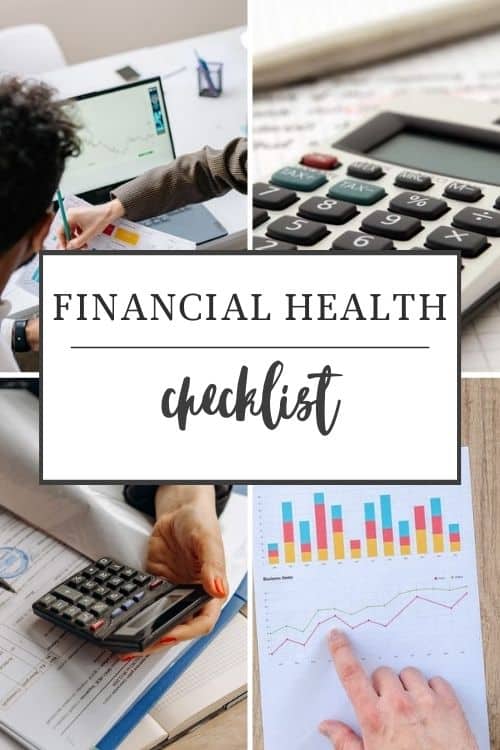Last Updated on January 11, 2023 by Ellen Christian
Many people over 50 are not financially fit. They have no idea how to do a financial health check and where they stand in the present day.
Posts may be sponsored. This post contains affiliate links, which means I will make a commission at no extra cost to you should you click through and make a purchase. As an Amazon Associate I earn from qualifying purchases.
It’s easy to find out if you’re financially healthy or not by following these simple tips.

Financial Health Check
This article walks you through the process of doing a comprehensive financial checkup for yourself or someone close to you. It includes steps such as creating a budget, paying off debt, and taking advantage of tax savings opportunities.
It’s important to look at your overall financial life cycle including things like personal finance, student loans, emergency fund, physical health, and debts.
How do I assess my financial health?
There are a few different ways to assess your financial health. You can look at your income, expenses, assets, and liabilities. All of these make up your personal finance.
Your income is the money you earn each month. Your expenses are what you spend each month. Assets are what you own, such as your house, car, and savings account. Your liabilities are what you owe, such as your mortgage, car loan, and credit card debt.
If you want to get a more detailed picture of your financial wellness, you can use a budget. A budget is a plan that shows how much money you earn and how much money you spend each month. You can use it to track your progress towards your financial goals.

How do I improve my financial health?
There are a few things you can do to improve your financial health. You can start by paying off your debt. You can also take advantage of tax savings opportunities and estate planning.
Eliminating debt is important because it can help you save money on interest payments. It can also help you improve your credit score. It’s an important part of your financial checkup.
Taking advantage of tax savings opportunities can help you save money on your taxes. This can help you improve your financial situation.
What are the biggest threats to my financial health?
The biggest threats to your financial health are things like unexpected expenses and losing your job. Unexpected expenses can be a big problem because they can throw your budget off track.
Losing your job can be a problem because it puts you at risk of not having enough income to pay for your expenses. An unexpected car repair that you have to pay for can impact your financial well-being.

I need help assessing my financial health. What do I do?
If you’re concerned about your financial health, there are a few things you can do. You can use the tips in this article to assess your financial health. You can also find a financial professional to help you out with your assessment.
Determine your net worth, and see which way it’s trending
One of the simplest and most effective ways to measure your financial health is to calculate your net worth. This is a calculation that shows the difference between your assets and your liabilities.
Your assets are everything you own, while your liabilities are everything you owe. To calculate your net worth, simply subtract your liabilities from your assets. This should take just a few minutes and can be very valuable when doing a financial health check up.

Track your spending
Another simple way to examine your financial health is to track how much money you spend each month. You should start by tracking your spending for at least three months, which you can review each quarter. This will show you where you are spending the most money so that you know where to cut back.
You may want to try the 50/30/20 rule to see if it helps you decrease your expenses. This means that you should spend 50% of your income on necessities, 30% on wants, and 20% on savings.
Make adjustments, review your budget
Whenever you determine where the budget goes, you can make adjustments. Keep in mind spending less takes practice. You may not get it on the first attempt. That’s okay, continue to review and adjust your budget as needed. It will help you learn more about your money habits,
Review your savings and investments for the long-term
All of these can be used to store the money you need to deal with unforeseeable situations. Find an aim at $1,000 or less and then plan to boost your money in 3 to 6 months to cover bare-bones expenses.
Add investments and saving money to your monthly budget. Investing will be important in later life.
Make sure your financial strategy matches your situation
Your strategy should reflect your age, retirement goals, and risk tolerance. If you’re not comfortable making your own financial decisions, consider working with a financial professional. They can help you make financial decisions,
Credit report and score
The three major credit reporting firms Equifax, Experian, and TransUnion must provide a free copy of the credit report annually to people if they request it. Make sure you request your free credit report yearly as part of your financial health check. It’s helpful to know what your credit score is when doing a financial health check.
What is a credit score?
It’s a number that represents your creditworthiness. If you have a higher score, lenders will see you as a better risk and may be more likely to give you loans and credit at lower interest rates. A good credit score can save you thousands of dollars over time

Insurance
The requirements for insurance change gradually. Keep your health and home coverage up-to-date and have sufficient home insurance in your possession or apartment. Don’t forget to include life insurance when you’re evaluating your insurance needs.
You can look into a life insurance policy to provide income protection when you are gone. Make this a part of your financial goals when preparing for retirement.
Retirement savings
Look into the various retirement savings options available to you. Depending on your work status and your finances, you may want to consider 401K plans, a simple or Roth IRA, or other investment options. Remember that diversification is important. Don’t keep all your savings in one place.
Get help improving your financial life
World Financial Group offers solutions with services that will help you feel confident about the important decisions concerning your personal finances. World Financial Group is backed by Transamerica and licensed to help people of all backgrounds gain control over their finances find what matters most. Offering products from well-known providers such as Nationwide and Pacific Life in addition to customized solutions for specific needs or goals World offers solutions that will have you feeling confident when making important decisions about your personal finances.
Talk to them today as part of your financial health check.
More finance articles

Ellen is a busy mom of a 24-year-old son and 29-year-old daughter. She owns six blogs and is addicted to social media. She believes that it doesn’t have to be difficult to lead a healthy life. She shares simple healthy living tips to show busy women how to lead fulfilling lives. If you’d like to work together, email info@confessionsofanover-workedmom.com to chat.

